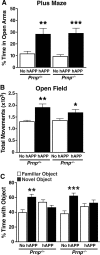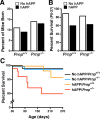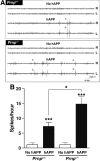Ablation of cellular prion protein does not ameliorate abnormal neural network activity or cognitive dysfunction in the J20 line of human amyloid precursor protein transgenic mice
- PMID: 21775587
- PMCID: PMC3314063
- DOI: 10.1523/JNEUROSCI.1459-11.2011
Ablation of cellular prion protein does not ameliorate abnormal neural network activity or cognitive dysfunction in the J20 line of human amyloid precursor protein transgenic mice
Erratum in
- J Neurosci. 2011 Sep 28;31(39):14046
Abstract
Previous studies suggested that the cellular prion protein (PrP(c)) plays a critical role in the pathogenesis of Alzheimer's disease (AD). Specifically, amyloid-β (Aβ) oligomers were proposed to cause synaptic and cognitive dysfunction by binding to PrP(c). To test this hypothesis, we crossed human amyloid precursor protein (hAPP) transgenic mice from line J20 onto a PrP(c)-deficient background. Ablation of PrP(c) did not prevent the premature mortality and abnormal neural network activity typically seen in hAPPJ20 mice. Furthermore, hAPPJ20 mice with or without PrP(c) expression showed comparably robust abnormalities in learning and memory and in other behavioral domains at 6-8 months of age. Notably, these abnormalities are not refractory to therapeutic manipulations in general: they can be effectively prevented by interventions that prevent Aβ-dependent neuronal dysfunction also in other lines of hAPP transgenic mice. Thus, at least in this model, PrP(c) is not an important mediator of Aβ-induced neurological impairments.
Figures




Similar articles
-
Amyloid-beta levels are significantly reduced and spatial memory defects are rescued in a novel neuroserpin-deficient Alzheimer's disease transgenic mouse model.J Neurochem. 2011 Sep;118(5):928-38. doi: 10.1111/j.1471-4159.2011.07359.x. Epub 2011 Jul 18. J Neurochem. 2011. PMID: 21689108
-
Suppression of Alzheimer's disease-related phenotypes by expression of heat shock protein 70 in mice.J Neurosci. 2011 Apr 6;31(14):5225-34. doi: 10.1523/JNEUROSCI.5478-10.2011. J Neurosci. 2011. PMID: 21471357 Free PMC article.
-
Neprilysin overexpression inhibits plaque formation but fails to reduce pathogenic Abeta oligomers and associated cognitive deficits in human amyloid precursor protein transgenic mice.J Neurosci. 2009 Feb 18;29(7):1977-86. doi: 10.1523/JNEUROSCI.2984-08.2009. J Neurosci. 2009. PMID: 19228952 Free PMC article.
-
Memory impairment in transgenic Alzheimer mice requires cellular prion protein.J Neurosci. 2010 May 5;30(18):6367-74. doi: 10.1523/JNEUROSCI.0395-10.2010. J Neurosci. 2010. PMID: 20445063 Free PMC article.
-
Cognitive phenotyping of amyloid precursor protein transgenic J20 mice.Behav Brain Res. 2012 Mar 17;228(2):392-7. doi: 10.1016/j.bbr.2011.12.021. Epub 2011 Dec 19. Behav Brain Res. 2012. PMID: 22197298
Cited by
-
Prion-Protein-interacting Amyloid-β Oligomers of High Molecular Weight Are Tightly Correlated with Memory Impairment in Multiple Alzheimer Mouse Models.J Biol Chem. 2015 Jul 10;290(28):17415-38. doi: 10.1074/jbc.M115.643577. Epub 2015 May 27. J Biol Chem. 2015. PMID: 26018073 Free PMC article.
-
Amyloid-β induced signaling by cellular prion protein and Fyn kinase in Alzheimer disease.Prion. 2013 Jan-Feb;7(1):37-41. doi: 10.4161/pri.22212. Epub 2012 Sep 17. Prion. 2013. PMID: 22987042 Free PMC article. Review.
-
Prion protein stabilizes amyloid-β (Aβ) oligomers and enhances Aβ neurotoxicity in a Drosophila model of Alzheimer's disease.J Biol Chem. 2018 Aug 24;293(34):13090-13099. doi: 10.1074/jbc.RA118.003319. Epub 2018 Jun 10. J Biol Chem. 2018. PMID: 29887525 Free PMC article.
-
Prion propagation, toxicity and degradation.Nat Neurosci. 2012 Jun 26;15(7):936-9. doi: 10.1038/nn.3120. Nat Neurosci. 2012. PMID: 22735515 Review.
-
Involvement of 'stress-response' kinase pathways in Alzheimer's disease progression.Curr Opin Neurobiol. 2014 Aug;27:110-7. doi: 10.1016/j.conb.2014.03.011. Epub 2014 Apr 5. Curr Opin Neurobiol. 2014. PMID: 24709372 Free PMC article. Review.
References
-
- Aguzzi A, Baumann F, Bremer J. The prion's elusive reason for being. Annu Rev Neurosci. 2008;31:439–477. - PubMed
-
- Balducci C, Beeg M, Stravalaci M, Bastone A, Sclip A, Biasini E, Tapella L, Colombo L, Manzoni C, Borsello T, Chiesa R, Gobbi M, Salmona M, Forloni G. Synthetic amyloid-{beta} oligomers impair long-term memory independently of cellular prion protein. Proc Natl Acad Sci U S A. 2010;107:2295–2300. - PMC - PubMed
-
- Büeler H, Fischer M, Lang Y, Bluethmann H, Lipp H, DeArmond S, Prusiner S, Aguet M, Weissmann C. Normal development and behaviour of mice lacking the neuronal cell-surface PrP protein. Nature. 1992;356:577–582. - PubMed
Publication types
MeSH terms
Substances
Grants and funding
- R01 AG011385/AG/NIA NIH HHS/United States
- P01 AG022074-10/AG/NIA NIH HHS/United States
- R01 AG011385-08/AG/NIA NIH HHS/United States
- AG011385/AG/NIA NIH HHS/United States
- C06 RR018928-01/RR/NCRR NIH HHS/United States
- AG022074/AG/NIA NIH HHS/United States
- P01 AG022074/AG/NIA NIH HHS/United States
- NS065780/NS/NINDS NIH HHS/United States
- P30 NS065780-03/NS/NINDS NIH HHS/United States
- RR18928/RR/NCRR NIH HHS/United States
- P30 NS065780/NS/NINDS NIH HHS/United States
- R37 AG011385/AG/NIA NIH HHS/United States
- C06 RR018928/RR/NCRR NIH HHS/United States
LinkOut - more resources
Full Text Sources
Molecular Biology Databases
Research Materials
